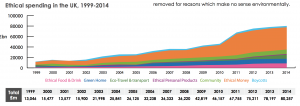2014 was a good year for going good with money. Values-based investment was up by 9 per cent in 2014 and the sale of ethical goods up 8 per cent, driven by lower carbon choices such as renewable energy purchases and electric and hybrid cars, according to the latest ethical market report from Triodos Bank and Ethical Consumer magazine.
Ethical spending has continued to grow despite difficult market conditions, according to the report. Here’s a great little graph illustrating this:

The overall value of the ethical market grew from £35bn to £38bn, showing a continued commitment from people across all sectors to support more ethical products and services. Sales of electric, hybrid and other tax-band A-rated cars grew by 40% to nearly £7bn, and spending on solar panels rose by nearly 25% to £716m.
The value of money held ethically fell by 2%, largely caused by accounts being closed or moved from the Co-operative Bank. All other elements in the sector – including savings and investments with Triodos Bank – showed year on year growth. Ethical investment grew by 9% to £13bn. Combined ethical money and ethical spending totals rose from £78bn to £80bn.
Charles Middleton, managing director of Triodos Bank, said: “Every one of has a role to play in tackling the pressing social and environmental challenges facing us, and making conscious choices about how we use our money is one of the most powerful ways each of us can make a difference. This includes the products we buy, the companies we buy from and the banks we entrust our money with. The report’s findings are a very positive sign for ethical consumption, demonstrating that despite continuing economic hardship, people are making conscious choices, and at a growing rate.”
Rob Harrison, editor of Ethical Consumer magazine, said: “Disappointing changes to government incentives for home renewable energy installations and lower impact motoring in 2015 will threaten the strong growth in sales of lower carbon choices identified in this report. Successive reports have shown that government incentives to encourage ethical behaviours can bring the most dramatic changes in consumer impacts and should be used more rather than less.”




